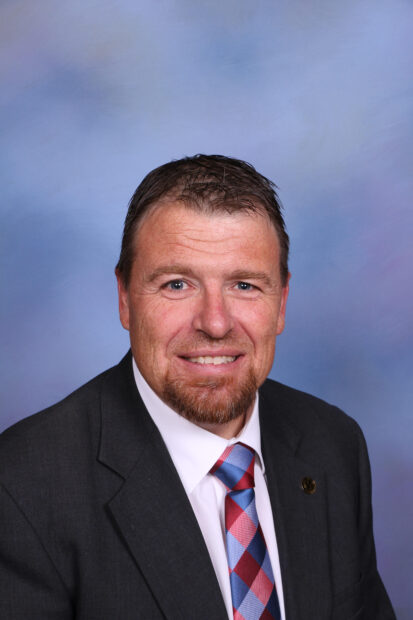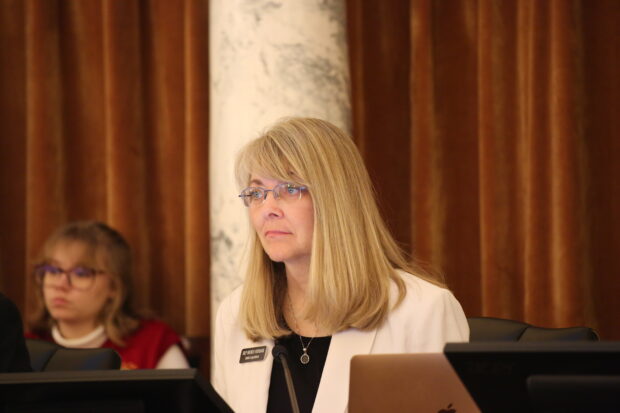
DEVIN WEEKS/Coeur d’Alene Press
The 2023 Legislature red-lined the March election — the date school districts have most often used to run supplemental levies.
School districts have only three options for election day. But they also have more money. The same law that took away the March election also will provide tens of millions of dollars to pay down school property taxes. Lawmakers hope this money will reduce the burden on local property owners, and eat into a statewide supplemental levy bill that exceeds $200 million a year.
State superintendent Debbie Critchfield doesn’t know what to expect. “I have worked so many scenarios out in my mind.”
She’s not alone.
What lawmakers did in 2023 — and why
There are clear parallels between the 2022 and 2023 legislative sessions. Both years, school levies became embroiled in a far-reaching, high-priority end-of-year bill.
In 2022, lawmakers passed a bill to support Gov. Brad Little’s $72 million-a-year literacy program. But they shoehorned language into the bill requiring school districts to spell out how they spend supplemental levies.
In 2023, lawmakers cobbled together a complicated property tax law, and schools were right in the middle of the mix.
The law, House Bill 292, earmarks money to offset school property taxes, an estimated $85 million next year. Districts will begin to get this money in 2023 — and supporters of the law hope this is just the first installment in a multiyear effort to wean schools off of the property tax.

But as part of the deal, HB 292 killed the standalone March school election.
This wasn’t the first time legislators tried to downsize the election calendar, which had allowed school districts to seek levies or a bond issue on four dates. March had long been a target. Critics said the election date allowed school districts to sneak through ballot measures in a low-turnout, low-profile election.
“How can school districts honestly look at their patrons and ask for running a supplemental (levy) in March when they don’t even know what the Legislature’s going to give them?” said House Speaker Mike Moyle, a co-sponsor of the property tax overhaul, days before the Legislature overrode Gov. Brad Little’s veto and passed the property tax law. “That’s not even honest. … It’s gaming the system.”
A disconnect between Statehouse and local politics?
The outcry at the Statehouse notwithstanding, supplemental levies remain popular across much of the state.
“I think smaller schools are different,” said Kendrick Jared, outgoing superintendent in the rural Whitepine School District. “I kind of think (voters) feel a personal connection with the school, or the kids, or the staff.”
In 2022-23, 40 districts ran supplemental levies, and 38 managed to get something passed, a 95% success rate. A few elections were contentious, and four districts had to rewrite and rerun levies to get voter support. In 20 districts, mostly in rural Idaho, levies sailed through with at least 70% support.

“I think smaller schools are different,” said Kendrick Jared, superintendent in the Whitepine School District, where a one-year, $880,000 passed in May with a 73% majority. “School is one of the main things in the community. … I kind of think (voters) feel a personal connection with the school, or the kids, or the staff.”
Jared knows that connection firsthand — and with patrons who can buttonhole their superintendent or elected trustee at the neighborhood grocery store, after a church service or at halftime during a basketball game. But after 2 ½ years at the helm of the North Idaho district, Jared is leaving education: He has taken a job as a financial adviser for Edward Jones, in the Lewiston-Clarkson, Wash., area.
But Jared isn’t the only superintendent who sees a disconnect between the Statehouse and Main Street Idaho.
“It shouldn’t be made harder to pass levies, just because you don’t like the levies,” said Brady Dickinson, superintendent of the Twin Falls School District, where patrons have routinely passed levies for years. “We’re a local control state, but I feel like when it comes down to funding, there’s a certain pulling back.”
Will it be harder to pass levies in the future?
Now that HB 292 has taken the March election off the table, school districts have three remaining options:
- They can run elections in late August — in an under-the-radar election date that coincides with the back-to-school season and the tail end of summer vacation. And lawmakers are no big fans of this election date. In 2023, before HB 292 eliminated the March election, the House passed a separate bill to nix the March and August elections. Supplanted by HB 292, this bill stalled out in the Senate. “I’m sure that the August election date will come under attack in the next legislative session,” said Jerome district Superintendent Pat Charlton.
- The November election date is an option. But it means, in even-numbered years, school levies would vie for attention against a presidential election or a gubernatorial race, and a full slate of partisan elections. In odd-numbered years, levies would appear on the ballot alongside school trustee races and nonpartisan city elections.
- The third option is May — and, in even-numbered years, alongside party primary elections. In any year, May is an all-or-nothing election date, falling weeks before the school budget year starts on July 1. Failure leaves no margin for error and no time to adjust. After a levy election failed in the West Bonner School District in May, trustees quickly announced plans to cut sports and extracurriculars, KXLY TV reported.
Even though Coeur d’Alene voters approved a two-year, $50 million supplemental levy just a month ago, Superintendent Shon Hocker is already casting a nervous eye to the future. The district will need to run a renewal in 2024-25. Seeking voter approval in November 2024 would leave the district fighting to be heard above the noise and commotion of a presidential campaign.
“I think a lot of people are questioning what their next move is,” said Quinn Perry, deputy director of the Idaho School Boards Association.
“We’re debating already,” he said. “There’s no sigh of relief for me.”
Idaho School Boards Association deputy director Quinn Perry expects to see districts move toward the November election, even though November creates a lot of lag time. Districts would run elections well before the legislative session — with no solid idea of what to expect from state K-12 budgets. “I think a lot of people are questioning what their next move is,” she said.
In Emmett, school officials ran an unsuccessful levy election in March, and got voter approval for two smaller, separate levies two months later. A May election is a one-shot proposition, Superintendent Craig Woods said, but that underscores the need to listen to voters.
“I don’t think it’s the end of the world,” Woods said of the demise of the March election. “It just means you have to build the trust, and the relationships with the community.”
A life after levies?
HB 292 represents a classic tradeoff. Is the money — the projected $85 million this year, and the promise of more to come — more valuable to the schools than the March election date? Or will the truncated election calendar make it tougher for districts to pass supplemental levies that augment employee salaries, reduce class sizes, hire school resource officers, and cover the costs for extracurriculars and sports?
Like nearly every Republican in the Legislature, House Education Chairwoman Julie Yamamoto voted for HB 292, overriding Little’s veto. Yamamoto, R-Caldwell, hopes the law represents a down payment that reduces school property taxes.
“I think it’s fair to say that we’ve been responsive to the evidence we’ve seen of what schools are levying for,” said Rep. Wendy Horman, R-Idaho Falls, co-chair of the Joint Finance-Appropriations Committee.
It could. But the law also gives schools specific instructions for using their share of the money. First, they need to pay down existing bond issues. Then, they can pay down existing supplemental levies. After that, they can put the money aside to cover future building projects, or they put it toward future bond issues.
Several of these steps could mitigate the need for bond issues — multiyear financing plans that help districts build new schools and replace aging ones. But they might not do much to address one- or two-year levies that help pay for school operations.
Ultimately, that’s one of Critchfield’s concerns. She’s not sure HB 292 will ease the supplemental levy burden, leaving legislators looking for other ways to clamp down.

But Rep. Wendy Horman expects and hopes to see Idaho’s supplemental levy bill decrease over time. The co-chair of the budget-writing Joint Finance-Appropriations Committee points to several other spending decisions from 2023 — an additional $145.6 million for teacher salaries, $97.4 million for classified employee salaries, and $20 million in school safety grants, which address recurring themes from supplemental levy elections across Idaho.
“I think it’s fair to say that we’ve been responsive to the evidence we’ve seen of what schools are levying for,” said Horman, R-Idaho Falls.
But while school superintendents have learned to live with levies, many would just as soon get out of the business.
That includes Russ Mitchell, who commutes daily from Washington state to his job on the Coeur d’Alene Indian Reservation. Mitchell says he’d still rather work in Idaho, despite the headaches of Idaho school finance. Which meant, in his Plummer-Worley School District, a six-month effort to pass a supplemental levy in August, after two unsuccessful attempts.
In Idaho, school financing is hard, and campaigning for levies is a constant part of the job description.
“It’s not about the instruction in the classroom specifically,” he said. “You spend a tremendous amount of time making sure the public knows what’s going on.”
This series at a glance
Monday: A new law requires transparent levy elections — but the results are mixed
Tuesday: Districts lean on short-term levies to pay for long-term investments — people
Wednesday: All politics is local, and levy elections can be contentious, or routine
Thursday: Lawmakers rewrote the school election calendar. What happens next?
